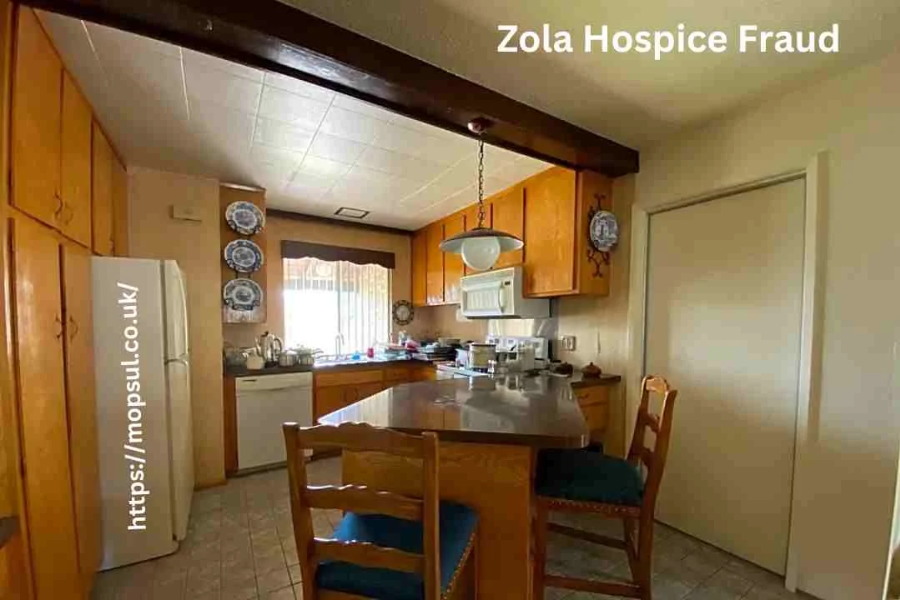“Exposing Zola Hospice: A Closer Look at the Alleged Fraudulent Practices”
Hospice care is a critical service designed to provide comfort and support to individuals facing the end of their lives. It focuses not just on the physical needs of patients but also on their emotional and spiritual well-being. For families and caregivers, hospice care offers relief, ensuring their loved ones receive compassionate care during their final days. Organizations like Zola Hospice have been instrumental in offering these essential services. However, recent allegations of fraud surrounding Zola Hospice have raised serious concerns, putting a spotlight on the integrity of their care.
This article aims to delve into the allegations against Zola Hospice, the details of the reported fraudulent activities, and how healthcare fraud can harm not just the system but the very people it is meant to help. More importantly, it will offer practical steps individuals can take to protect themselves from falling victim to healthcare fraud. Whether you’re a caregiver, a patient, or simply interested in understanding healthcare ethics, staying informed is critical in ensuring quality care at the end of life.
Unveiling the Allegations: What is the Issue at Zola Hospice?
Recent accusations have emerged against Zola Hospice, a once-trusted name in end-of-life care. Reports have surfaced that suggest the organization might have engaged in fraudulent billing practices and misrepresented the services provided to patients. The seriousness of these allegations cannot be overstated. Fraud in healthcare, especially hospice care, undermines the trust between patients, families, and care providers.
The allegations involve claims that Zola Hospice may have billed for services that were either not delivered or inaccurately portrayed. This means that families may have paid for care their loved ones never received, or Zola Hospice might have exaggerated the level of care provided to get higher reimbursements from insurance companies.
Details of the Fraudulent Activities
At the heart of these allegations are claims of fraudulent billing and record falsification. Whistleblowers from within the organization have come forward, revealing that Zola Hospice may have billed for services that were either unnecessary or never rendered.
For example, there are reports that some patients were charged for medical services they never received, or their medical records were altered to reflect more intensive care than was provided. This not only allowed the hospice to charge insurance companies more but also misled families into believing their loved ones were receiving top-notch care.
Investigative journalists and healthcare watchdogs have also shed light on these practices, revealing the full extent of the problem. While legal proceedings are still underway to determine the truth, the mere suggestion of such behavior has eroded trust in Zola Hospice and the larger hospice care system.
Investigation and Reporting
The allegations against Zola Hospice didn’t arise from one source alone. A combination of whistleblower reports and investigative journalism brought these concerns to light. Employees within the organization took the courageous step of revealing the misconduct, leading to broader investigations into the hospice’s operations.
As these reports emerged, they prompted legal actions to explore the full extent of the fraud and misconduct. The outcome of these legal proceedings will ultimately determine whether Zola Hospice was engaging in illegal activities and, if so, how extensive the harm was. However, the damage to the hospice’s reputation has already been significant.
Impact on Patients and Families
For the families and patients involved, the allegations against Zola Hospice are devastating. The families of hospice patients are in a vulnerable position, trusting the organization to provide comfort and care during one of the most difficult times in their lives. If these claims are proven true, it means that some of these families were charged for services they never received, adding a financial burden to their emotional distress.
Worse still, if patients did not receive the care they needed due to fraudulent practices, they may have experienced needless suffering. This betrayal of trust could lead to lasting psychological and emotional impacts, not only for the families but for the patients themselves in their final moments.
The Broader Context: Healthcare Fraud and Its Implications
Healthcare fraud is not unique to hospice care. It is a widespread problem that affects various parts of the healthcare system. Fraudulent activities in healthcare can take many forms, from overbilling for tests and procedures to falsifying patient records for financial gain. When this occurs, it undermines the quality of care and often results in higher costs for patients, insurers, and taxpayers.
Types of Healthcare Fraud
Healthcare fraud can manifest in several ways, such as:
- Billing for unnecessary services: Providers may order and bill for tests, procedures, or treatments that patients do not need.
- Falsifying patient records: Altering medical records to show that more services were provided or that more expensive treatments were necessary.
- Submitting false insurance claims: Overstating the level of care provided or charging for services that were never rendered.
These practices not only defraud insurance companies but also diminish the quality of care patients receive. In the case of hospice care, where patients are at their most vulnerable, such actions can have devastating consequences.
Regulatory Framework
There are regulatory measures in place to combat healthcare fraud. Laws like the False Claims Act are designed to hold healthcare providers accountable for fraudulent billing practices. These regulations require providers to maintain accurate records and ensure that they only bill for services genuinely provided. However, gaps in enforcement can allow some unethical providers to slip through the cracks.
Moreover, the complexity of healthcare billing and insurance systems can make it difficult for patients and families to detect fraud, particularly in emotionally challenging situations like hospice care.
Consequences of Healthcare Fraud
The effects of healthcare fraud are far-reaching. Financially, it leads to increased costs for healthcare providers and patients alike. Taxpayers may also bear the burden, as government insurance programs like Medicare and Medicaid often foot the bill for fraudulent claims.
However, the consequences go beyond finances. When healthcare providers engage in fraud, they undermine patient trust and degrade the quality of care. This can lead to emotional and physical harm, particularly in hospice care, where the goal is to provide comfort and dignity in a patient’s final days.
Steps to Prevent and Address Healthcare Fraud
While regulatory agencies and legal systems play a critical role in combating healthcare fraud, patients and their families also have an essential part to play in protecting themselves.
Preventative Measures for Families and Caregivers
Families and caregivers should stay vigilant by carefully reviewing medical bills and records. If something seems off—such as charges for services that were never mentioned—it’s important to ask questions. Keeping track of the care a patient is receiving can help identify potential discrepancies between what’s billed and what’s actually provided.
Advocacy and Reporting
If you suspect fraud, it’s vital to report it. There are several resources available to assist families and patients in reporting healthcare fraud, including government agencies like the Office of Inspector General (OIG) and advocacy groups specializing in healthcare rights. By reporting suspected fraud, you help ensure accountability and prevent other patients from being victimized.
Improving Transparency and Accountability
On a larger scale, healthcare providers and policymakers need to work together to improve transparency and accountability within the system. Stricter regulations on billing practices and patient records can help prevent fraud before it happens. Enhanced oversight from both governmental and non-governmental organizations is crucial for detecting fraudulent activity early and holding those responsible accountable.
Conclusion
The allegations against Zola Hospice serve as a stark reminder of the importance of trust in healthcare, especially in hospice care. Fraudulent practices, such as improper billing and misrepresenting care, can cause significant harm to patients and their families—both emotionally and financially.
To protect against healthcare fraud, it is vital for individuals to remain informed, ask questions, and take action when something seems wrong. Reporting suspected fraud can lead to accountability and help ensure that hospice care organizations uphold the standards of quality and integrity that patients and families deserve.
Healthcare fraud damages more than just wallets; it can erode the very foundation of trust between caregivers and those they serve. By staying vigilant and advocating for greater transparency, we can help ensure that the most vulnerable among us receive the dignified and compassionate care they deserve in their final moments.
Facts:
- Allegations Against Zola Hospice: Zola Hospice, once a trusted provider of hospice care, is facing allegations of fraudulent billing practices, including charging for services that were never rendered and misrepresenting the level of care provided to patients.
- Fraudulent Activities: Whistleblowers and investigative journalists have revealed that Zola Hospice may have altered patient records to claim higher reimbursements from insurance companies, resulting in families being overcharged for services not provided.
- Impact on Families: The fraudulent activities allegedly carried out by Zola Hospice have caused emotional and financial distress to families, as their loved ones might not have received the proper care they were promised.
- Investigation and Legal Proceedings: Legal investigations are underway to determine the extent of the fraud, and the whistleblowers’ testimonies are central to these proceedings. The organization’s reputation has already suffered significant damage.
- Broader Context of Healthcare Fraud: The Zola Hospice case reflects a larger issue in the healthcare industry, where fraud through overbilling, falsified patient records, and false insurance claims undermines the quality of care and inflates costs for everyone involved.
- Preventative Measures: Families and caregivers are advised to remain vigilant, regularly review medical records, and report discrepancies to authorities, such as the Office of Inspector General (OIG).
- Regulatory Framework: Laws like the False Claims Act are designed to prevent fraudulent billing, but gaps in enforcement allow some providers to commit fraud, affecting patients and healthcare systems alike.
FAQs:
- What is the Zola Hospice fraud case?
- Zola Hospice is facing allegations of fraudulent billing practices, including charging for services that were not rendered and misrepresenting the level of care provided to patients.
- What are the main accusations against Zola Hospice?
- The primary allegations include fraudulent billing for unnecessary services or services that were never provided and falsifying patient records to claim higher insurance reimbursements.
- Who brought the allegations to light?
- Whistleblowers within the organization, along with investigative journalists, exposed the alleged fraudulent practices at Zola Hospice.
- How has the alleged fraud affected families and patients?
- Families have been financially burdened by paying for services their loved ones never received, and patients may have suffered due to a lack of proper care.
- What steps can families take to protect themselves from healthcare fraud?
- Families can protect themselves by reviewing medical bills and patient records, questioning discrepancies, and reporting suspected fraud to agencies like the Office of Inspector General (OIG).
- What legal protections are in place to combat healthcare fraud?
- Laws like the False Claims Act hold healthcare providers accountable for fraudulent billing practices, but enforcement can sometimes fall short, allowing fraudulent activities to occur.
- What are the consequences of healthcare fraud?
- Healthcare fraud leads to increased costs for patients, insurers, and taxpayers, while also degrading the quality of care provided to patients, especially in sensitive areas like hospice care.
- How can healthcare providers prevent fraud?
- Healthcare providers need to adopt stricter billing regulations, maintain accurate patient records, and improve oversight to ensure transparency and accountability within the system.






